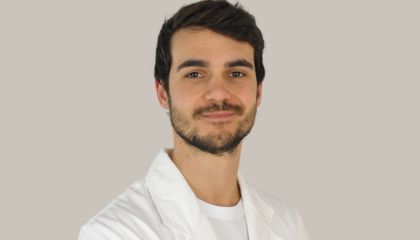Specialist in pediatric rheumatology in Barcelona
At Turó Park Clinics, we know that children's health requires a specialized and close approach. That is why our pediatric rheumatology service in Barcelona is designed to accompany children and their families in the diagnosis and treatment of childhood rheumatic diseases, with personalized attention and cutting-edge technology.
Our multidisciplinary team is composed of a pediatric rheumatologist with extensive experience in chronic autoimmune and inflammatory pathologies, working in close collaboration with other pediatricians and physiotherapists. We focus not only on relieving symptoms, but also on improving the child's or adolescent's quality of life in the long term.
To book an appointment or speak to one of our friendly team, please contact us via the options below.
What is pediatric rheumatology?
Pediatric rheumatology is the medical specialty that deals with the study, diagnosis and treatment of inflammatory, autoimmune and musculoskeletal diseases affecting children and adolescents. Its field covers all disorders of the locomotor system in pediatric age, including joints, muscles, bones and soft tissues.
As chronic diseases, they can interfere with a child's physical development, growth and quality of life. Therefore, early diagnosis and a comprehensive approach, adapted to each stage of development, are essential to prevent long-term physical and emotional sequelae.

Most common rheumatologic diseases in children
Pediatric rheumatologic diseases encompass a broad spectrum of conditions. The most common include:
It is the most common childhood rheumatic disease. It is characterized by persistent joint inflammation for more than six weeks in children under 16 years of age. It may occur in one or more joints, with or without general symptoms such as fever or rash.
Diseases of the innate immune system that cause inflammation without infection. PFAPA syndrome is the most common in childhood and manifests with recurrent fever, thrush, pharyngitis and swollen glands. Although benign, it can affect quality of life, so a good diagnosis is key.
- Inflammation of bone growth points in active children and adolescents. It is frequent during growth spurts. Common examples are Osgood-Schlatter disease (knee) and Sever's disease (heel).
Another common vasculitis in childhood, characterized by palpable purpura, abdominal pain and arthralgias (joint pain).
Vasculitis that affects young children and can damage the coronary arteries if not treated in time. It manifests with prolonged fever, conjunctivitis, chapped lips and rash.
An autoimmune disease that can affect skin, kidneys, joints and other organs. In children it usually presents more aggressively than in adults, so early control is key.
Juvenile dermatomyositis
When is it recommended to see a pediatric rheumatologist?
Many rheumatologic symptoms in childhood may go unnoticed or be attributed to causes such as growth. However, there are certain warning signs that make an evaluation by a specialist advisable:
- Joint pain that persists for more than 6 weeks.
- Joint stiffness upon awakening or after periods of inactivity
- Swelling in one or more joints without previous trauma
- Recurrent fever with no apparent cause
- Skin rashes associated with muscle or joint pain
- Excessive tiredness or weight loss
- Family history of autoimmune diseases
At Turó Park Clinics we recommend an early evaluation for any of these symptoms. An early diagnosis can make the difference in prognosis and avoid permanent joint or systemic damage.
We take care of the little ones
Our pediatric rheumatology department welcomes you for the diagnosis and treatment of rheumatic and autoimmune diseases in children and adolescents.

How does a consultation at Turó Park Clinics work?
At Turó Park Clinics, the diagnostic process is designed to provide complete and personalized attention from the first visit.

Initial evaluation and clinical examination
We take the time to talk to the parents and understand the child's symptoms. During the examination we look for specific clinical signs to guide the diagnosis.

Specific analysis
We request specific tests such as ANA, PCR, ESR or rheumatoid factor, depending on the case. These help to identify or rule out autoimmune or inflammatory diseases.

Imaging studies
If necessary, we will order ultrasound or MRI scans to evaluate joint inflammation or the state of muscles and soft tissues.

Diagnosis and personalized follow-up
If a diagnosis is confirmed, we propose a treatment plan and periodic check-ups. We always adjust decisions according to the evolution and needs of the child.
It is important to know that there are no rigid protocols: each case is different and we adapt the process to the clinical and family context.
Why choose Turó Park Clinics?
At Turó Park Clinics, communication with families and diagnostic transparency are part of our commitment to children's well-being. Our approach combines:
- Multilingual care for international families.
- Fast appointments and continuous follow-up.
- Access to specialists from different areas in one place.
- Coordination between general pediatrics and specialized rheumatology.
- We also offer second opinions and assessments.
Frequently Asked Questions
How do I know if my child needs to see a pediatric rheumatologist?
What tests are performed?
Can childhood arthritis be cured?
Can you treat my child if he/she has a previous diagnosis?
